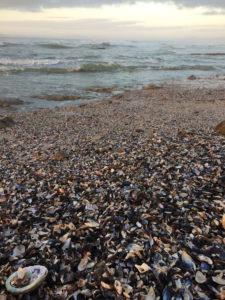by Ingrid Robeyns on January 6, 2018
I’ve written here before about the research I’ve been developing on ‘limitarianism’ – the view that we put upper limits or caps on how much of some valuable resource people can have or use. One thing that struck me when giving talks about limitarianism of financial resources/wealth, is that there’s always someone in the audience shouting: “Give me a number!” If the claim is that there should be an upper limit to how much income and wealth someone can have, people want to know what those limits are. Also, I’ve noted that whether or not someone finds the financial limitarian view plausible depends, among other things, on where exactly that ceiling would be put.
One question one could ask, is whether within a political community, there is something of a shared view (or dominant view), of where that ceiling should be (assuming people hold that there should be such a ceiling in the first place, obviously). So I decided to team up with a colleague from economic sociology who has ample experience with conducting surveys, and try to measure, among the Dutch population, whether they hold the view that there should be an upper limit to wealth, and if so, where they would put the cut-off line between ‘rich’ and ‘extremely rich’. Is there a level of material affluence at which we find that people are having not just a lot, but too much? [click to continue…]
by Ingrid Robeyns on December 20, 2017
In the tread following the announcement of my book, I had a brief discussion with our reader ccc about the fact that my book doesn’t engage with non-human animals. In their second comment, ccc wrote the following:
Political philosophy in general has a big problem though. It seems most authors can find some perfectly non-malicious, workload-related reason for giving non-human animals the excluded-via-footnote treatment. But the aggregate effect of all such cases is ongoing marginalization of the topic of non-humans from political philosophy. (The near complete absence of that topic on Crooked Timber over the years is a good illustration.)
Gladly there are some signs of (slow) change now, thanks in part to the “political turn” in animal ethics pioneered by among others Will Kymlicka and Sue Donaldson.
This type of critique is not specific to political philosophy, and should be taken seriously, so let’s discuss it outside the context of that particular book. [click to continue…]
by Ingrid Robeyns on December 11, 2017
 So, folks, here it is, my book on the capability approach that has been in the works for a very long time. I’m very happy that it is finally published, I am happy that you can download the PDF for free at the publisher’s website, and that the paperback version is also about half the price of what a book with a university press would cost (and a fraction of the price it would cost if published by one of the supercommercial academic presses whose names shall not be mentioned here).
So, folks, here it is, my book on the capability approach that has been in the works for a very long time. I’m very happy that it is finally published, I am happy that you can download the PDF for free at the publisher’s website, and that the paperback version is also about half the price of what a book with a university press would cost (and a fraction of the price it would cost if published by one of the supercommercial academic presses whose names shall not be mentioned here).
I am not going to sell you my book – in a literal sense there is no need to sell you anything since you can download the book (as a PDF) for free from Open Books Publishers’ website (and I have no material interest in selling you hardcopies since I will not receive any royalties). And in a non-literal sense I should not sell this book either, since it is not up to me to judge the quality of the book. So I’ll only make three meta-comments. [click to continue…]
by Ingrid Robeyns on October 30, 2017
It was Open Access week last week, but I was too busy trying to meet the deadline today for submitting my book manuscript to Open Book Publishers. That sounds like a good excuse if one cares about open access, right? I slept too little for too many days, so don’t expect any creative thoughts or subtle analyses from me tonight. But here’s two interesting things I discovered while having a look on the web figuring out whether anything interesting happend during Open Access week.
First, Cambridge University digitalised the PhD dissertation of Stephen Hawking and put it online. Apparently the website crashed when that got announced. Any Cambridge University alumni who want to make their PhD dissertation Open Access are invited doing so (no more need to go to the reading room and sign a fat notebook that one has accessed a particular PhD dissertation, as I once did. Although, I should confess, it felt like an adventure. But it’s highly inefficient obviously).
Second, for some weeks now, Open Book Publishers has been offering the PDFs of all of their books open access, to celebrate the 100th book they published (their regular regime is to have the books as html open access and selling the PDFs for a few pounds, or else the author can pay a fee for making the PDF open access). Importantly, this may only last for another a day or two (I am drawing from my memory when I saw a tweet on that about two months ago), so while it lasts it may be worth checking out their collection of books in the humanities and the social sciences, such as Naom Chomsky’s Delhi Lectures, Ruth Finnegan’s book on Oral literature in Africa or textbooks on maths for university. All for nothing. Because, as their slogan goes, knowledge is for sharing.
by Ingrid Robeyns on October 5, 2017
Philosophers from Catalonia are circulating a petition to plead for de-escalation of the current conflict. As this newspaper article reports, and as was confirmed to me by one of the original signatories, the group who took this initiative includes people in favour as well as against independence for Catalonia (and, presumable, some who think “it’s complicated” and have no firm views).
You are all invited to sign in order to call upon both the Spanish and the Catalan politicians to de-escalate and put in place a proper process through with all parties can peacefully engage with these questions, and hence replace confrontation and violence with a proper dialogue.
by Ingrid Robeyns on October 1, 2017
Catalonia is holding a referendum today on secession from Spain. Apparently it’s illegal because the Spanish constitution doesn’t allow anything that can threaten Spanish unity. I haven’t been following the arguments pro and con and don’t know to what extent the separatist views are widely shared among the people living in Catalonia. So I don’t have an informed opinion about Catalonia’s striving for independence, and know from the Belgian/Flemish case how the political background of striving for independence can be very complicated, and how easy it is as an outsider to know half of the facts and sensitivities, and make overly quick judgements on that partial knowledge. But one doesn’t need to have a well-informed view on whether or not this referendum should have taken place, to see that it’s a violation of human rights as well as politically utter stupid of the Spanish government to react with police violence (BBC, Guardian). Anyway, consider this an open thread on the Catalan referendum.
by Ingrid Robeyns on September 12, 2017
Once upon a time, and following the inspiring example of JQ who wrote large parts of his Zombie Economics on this blog, I started a project here writing chunks of my capabilities overview book (zero, one, two, three, four — and that was it). As some of you may recall, the aim of this book project is to provide a graduate-level introduction to the capability approach that would do justice to its radically interdisciplinary nature. I have good news and (to me at least) somewhat disappointing news. [click to continue…]
by Ingrid Robeyns on September 10, 2017

I was in Cape Town this week, for the annual conference of the Human Development and Capability Association (HDCA). Since earlier this year I was elected President-elect of the HDCA, and have also been an associate editor for its journal for a few years, I was occupied with the conference and organisation matters from the moment I arrived till the closing session which I chaired. It is frustrating to be in a building several days non-stop, and not seeing anything of the city, so I was very glad that Ina Conradie, my former PhD Student and a longtime resident of Cape Town took me to Mouille Point Beach, to inhale the smell of the ocean and get some clamshells for my sons. Friends had warned me that Cape Town beaches are white-sanded and may be without shells, but not this one! I’ve never seen so many shells on a single beach, including some very beautiful ones.
by Ingrid Robeyns on August 27, 2017

Longtime readers of our blog know that my oldest son Aaron (now 11) developed an interest in flower-arranging. It is wonderful to see how he has this talent that neither of his parents knew he had, nor did we do anything to help him discover this talent: he did it all by himself initially, with the help of some youtube demonstrations by Japanese flower artists. When we discovered what he could make, some local flower sellers started to support him, and he was lucky that my sister Kristin has a degree in flower arranging and hence could learn him some techniques. [click to continue…]
by Ingrid Robeyns on August 20, 2017
 We encountered this funny sight recently at the outskirts of Spa, where we were enjoying walking along the GR5. (More fans of the GRs out there?)
We encountered this funny sight recently at the outskirts of Spa, where we were enjoying walking along the GR5. (More fans of the GRs out there?)
I’m glad the owners of the (former) fence decided not to cut the tree, and obviously not because there aren’t enough trees in the area!
by Ingrid Robeyns on August 12, 2017

This is a picture of a memorial in Berlin Mitte, where from 1942 onwards the Nazis brought together 55.000 Jewish men, women, and children. They were then put on transport to Auschwitz and Theresienstadt, where they would be brutally murdered. The details on the memorial are pretty effective in reminding us of the scope of the inhumanity that the Nazis brought over Europe, but in the end the message is so simple that even Donald Trump must be able to understand this:
Never forget — resist war — protect peace.
by Ingrid Robeyns on August 6, 2017

I’ll be posting the Sunday Photoblog for a few weeks – Chris is occupied with other things. I only have my (old) smartphone at my disposal to make pictures, but I love making some shots when I’m walking, despite that they never capture the real thing. Here’s one from an evening walk in the South of France two weeks ago, half an hour before it started to rain.
by Ingrid Robeyns on May 21, 2017
Here’s an important article by Aiyana Bailin, who argues that the recent fidget spinning fad shows something disturbingly:
Something that was considered entirely pathological and in dire need of correction when done by disabled people is now perfectly acceptable because it is being done by non-disabled people
So here we see disability discrimination at work. For some neuro-atypical and disabled people, stimming is a way to reduce stress, and indeed also to concentrate better. But often they are told not to do this. The same holds for other forms of behaviour that neurotypicals consider ‘abnormal’. The fidget spinning just shows how much of a social convention, and hence form of domination, those social norms regarding ‘normal behaviour’ are, and that at least some of those conventions are biased against the needs of some groups of disabled people and neuro-atypicals.
Earlier this week, I came across another example. A therapist told me that social skills training for autistics entails, among other things, that they learn to look at the eyes of another person when talking to them. But why would that be a desirable good? What, except for some social convention, would make it that it is considered inappropriate not to look at the person you’re talking to? Why can’t we just accept it to be as it is – that for some people, it’s easier to have a conversation if they do not have to look you into the eyes?
But the good news is that the article by Aiyana Bailin gives us an opportunity to learn something. I suspect it will eye-opening to many of us. It’s an example of how disability discrimination works, and examples may well be more effective in showing the working of disability discrimination than some abstract theory. Yet it’s an example of a more general problem that Bailin wants to draw our attention to:
But the power structure is still there. There’s still a rigid hierarchy of who gets to decide which behaviors are normal or pathological. There’s still a societal subtext that tells people who are different “be less like yourself and more like us.” We need to work on that.
by Ingrid Robeyns on May 20, 2017
I’m packing for a short trip to Berlin, where I’ll be giving a public lecture on Monday on the question whether there should be an upper limit to how much wealth a person should morally be able to hold (it’s open to the public so you’re welcome!). The lecture will draw from a paper I wrote that was just published in the most recent volume of NOMOS, which was edited by Jack Knight and Melissa Schwartzberg, and which is entirely on Wealth (there is a link to the PDF of my chapter online too, though I’m not sure whether that will stay there for long). I haven’t been able to read the other papers in the Volume, but a quick skim suggests the other chapters should really be very interesting. I’ll write more about the volume after the Summer, when I will have embarked on a 5-year ERC-funded research project investigating the plausibility of upper limits on ecological and economic resources. [click to continue…]
by Ingrid Robeyns on April 22, 2017
It’s Global Earth Day, and this year the theme is environmental and climate literacy. I’d like to take us through an argument and a set of calculations. If what I write is correct, it only illustrates (but quite vividly, I think) the mess we’re in. So I hope that someone will convince me that what follows is wrong, or that the pessimistic conclusions do not follow.
[click to continue…]





